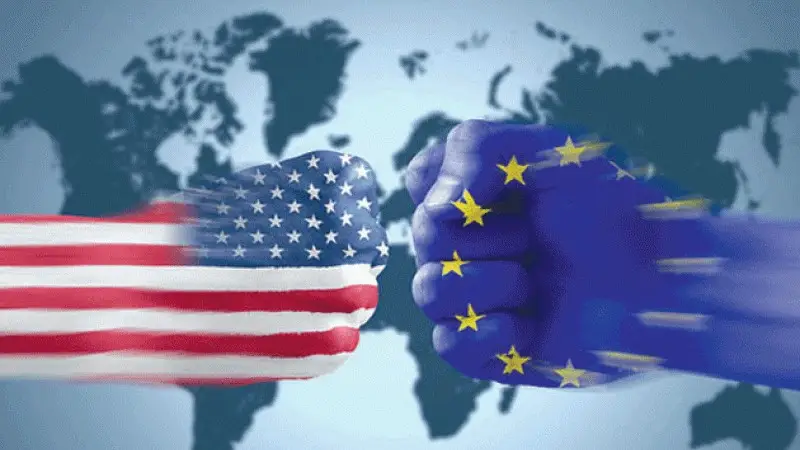
The trade conflict between the United States and Europe has taken an upward trend after US President Donald Trump issued a decision to increase customs duties on European goods, which, in the opinion of Europeans, may lead to changing the rules of global trade and reshaping economic alliances.
A few days after his executive orders to raise customs duties on imports from China, Mexico and Canada, US President Donald Trump issued another order related to raising customs duties by 10% or 20%, an increase that may cost Europe 1% of its GDP.
Trump said that "the European Union does not buy American cars or agricultural products, and does not buy almost anything," noting that America buys everything from the European Union countries, which indicates the US side's tendency to launch a new trade war against the European side.
Amid anticipation of the form that the recent customs "whip" decisions launched by the gambler Trump will take, the European voice has risen rejecting these decisions and calling for confronting this new challenge.
In this context, European Union President Ursula von der Leyen said that the "unjustified" US tariffs would not go unanswered, vowing to respond to them with "firm and proportionate countermeasures."
Noting that the European Union will act to protect its economic interests, she stressed, "We will protect our workers, our companies and our consumers," in a clear threatening tone.
The EU President hinted at the possibility that Europe might turn its face toward China, stating, "It is time to rebalance our relations with China in a spirit of fairness and reciprocity."
Before that, the European Commission issued a warning against the United States, and pledged to respond "immediately" if President Trump implemented tariffs that match those imposed by America's trading partners.
In turn, French Foreign Minister Jean-Noël Barrot issued a veiled threat against Europeans turning to new partners, noting that Europe has been working for years to diversify its trading partners, and that this process will accelerate due to Washington's imposition of new restrictions.
Noting that Trump imposed tariffs during his previous term that affected European Union countries, he recalled the response to them at that time, before confirming, "We will respond again now," adding that the decision will be in Brussels' hands.
The Europeans' silence did not last long, as the head of the European Parliament's Economic Affairs Committee, Aurore Lalucque, proposed another strategy, which is to impose taxes on major American companies such as "Google, Apple, Facebook, Amazon, and Microsoft."
In contrast to previous opinions, German Chancellor Olaf Scholz confirmed that the United States "if it leaves us no choice, the European Union will respond together," adding in a speech before parliament that "trade wars always ultimately lead to a cost of prosperity for both sides."
In the meantime, information was leaked from the head of the European Parliament's Trade Committee, Bernd Lange, indicating that Brussels is prepared to face a potential trade conflict with Washington; this time, compared to Trump's first term.
Bernd Lange confirms that there is a working group affiliated with the Commission that is seriously dealing with the US administration's tendencies to impose potential tariffs, in addition to a new law against US coercive economic measures prepared within a regulation, which allows them to be imposed quickly, including the suspension of patents and the exclusion of third countries from public contracts.
In practice, and in light of Washington's decisions regarding customs duties, the Financial Times revealed, Sunday, that the European Union intends to prevent the import of some food products manufactured according to different standards in an attempt to protect its farmers, which is in line with the US President's trade policy based on reciprocity.
The newspaper said, quoting three unnamed officials, that the European Commission will agree this week to study imposing stricter restrictions on imports.
It pointed out that early targets may include American crops such as soybeans grown using pesticides that farmers in the European Union are not allowed to use.
Observers and experts believe that Trump's trade policy will fail and will cause enormous damage to America, especially if European countries take retaliatory measures targeting American exports that depend on the European market.
Accordingly, experts stress that the logic of unilateralism that Trump is following, ignoring the rules of reciprocity and disregarding the nature of trade relations that are based on mutual interests, will not find a way to continue in the face of the European wall of resistance.
In light of this scene, what remains certain, according to experts, is that the European response to the American escalation will not be met with silence or submission, but with countermeasures that will recalculate the calculations in the White House.
M.M